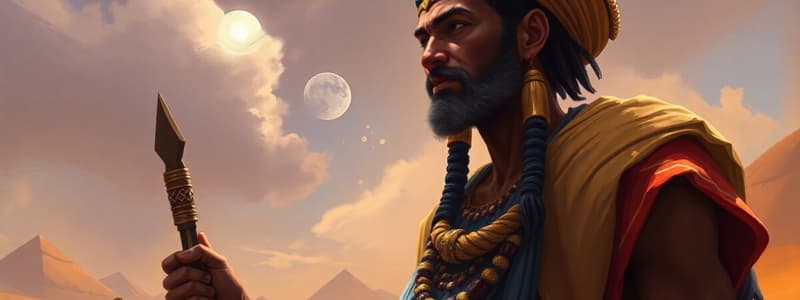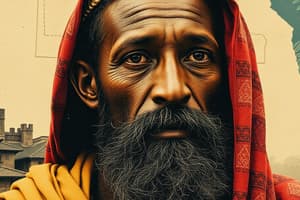Podcast
Questions and Answers
She came to Jerusalem for the Vision of ______.
She came to Jerusalem for the Vision of ______.
Peace
Origen looks to the Old Testament for examples of ______ that foreshadow the mystery of the church.
Origen looks to the Old Testament for examples of ______ that foreshadow the mystery of the church.
blackness
Ebed-Melech, the ______, saved the life of Jeremiah.
Ebed-Melech, the ______, saved the life of Jeremiah.
Kushite
The land of Kush usually meant ______, located south of Egypt.
The land of Kush usually meant ______, located south of Egypt.
The Nubians were known as early beneficiaries of Egyptian ______.
The Nubians were known as early beneficiaries of Egyptian ______.
Nubia was ultimately ruled by the ______ pharaohs, starting from Piankhi.
Nubia was ultimately ruled by the ______ pharaohs, starting from Piankhi.
Nubians developed their own writing and founded their own ______.
Nubians developed their own writing and founded their own ______.
Isaiah speaks of the powerful Nubian ______.
Isaiah speaks of the powerful Nubian ______.
Isaiah speaks of Egypt and its eventual defeat by ______.
Isaiah speaks of Egypt and its eventual defeat by ______.
The king of Judah at the time was ______.
The king of Judah at the time was ______.
The ruler Tirhakah is known as one of the last and greatest of the black ______.
The ruler Tirhakah is known as one of the last and greatest of the black ______.
The city of ______ was seized by the Assyrians during their invasion of Egypt.
The city of ______ was seized by the Assyrians during their invasion of Egypt.
The Nubian who emerges in the New Testament is often referred to as the 'Ethiopian ______.'
The Nubian who emerges in the New Testament is often referred to as the 'Ethiopian ______.'
In the story, the Ethiopian Eunuch was described as a wealthy ______.
In the story, the Ethiopian Eunuch was described as a wealthy ______.
The title 'kandake' used in Nubia refers to the queen ______.
The title 'kandake' used in Nubia refers to the queen ______.
The Ethiopian Eunuch possessed a personal scroll of the prophet ______.
The Ethiopian Eunuch possessed a personal scroll of the prophet ______.
This unnamed African is the first black to enter the Christian ______.
This unnamed African is the first black to enter the Christian ______.
Justinian ruled the Roman Empire from ______ between 527 and 565.
Justinian ruled the Roman Empire from ______ between 527 and 565.
Theodora supported the cause of the ______ - those holding the doctrine that Christ's human nature had been swallowed up by his divine nature.
Theodora supported the cause of the ______ - those holding the doctrine that Christ's human nature had been swallowed up by his divine nature.
The Council of ______ in 451 declared that Christ had two natures, human and divine.
The Council of ______ in 451 declared that Christ had two natures, human and divine.
The church of ______ in Egypt rejected Chalcedon’s definition and became known as Monophysites.
The church of ______ in Egypt rejected Chalcedon’s definition and became known as Monophysites.
By the sixth century, the original kingdom of Nubia had broken into three kingdoms: Nobatia, Makouria, and ______.
By the sixth century, the original kingdom of Nubia had broken into three kingdoms: Nobatia, Makouria, and ______.
By the final quarter of the sixth century, Nubia had become ______.
By the final quarter of the sixth century, Nubia had become ______.
Most of the Nubian treasures and ruins remained covered over by ______ until the middle of this century.
Most of the Nubian treasures and ruins remained covered over by ______ until the middle of this century.
An ancient people in Nubia built their churches with murals depicting the Virgin and the ______.
An ancient people in Nubia built their churches with murals depicting the Virgin and the ______.
The upper classes of Nubia used the Greek language as well as the ______ of Egypt.
The upper classes of Nubia used the Greek language as well as the ______ of Egypt.
The royal governor of Nobatia was called an ______.
The royal governor of Nobatia was called an ______.
Nubia had a unique Christian liturgy that may have been the liturgy of ______.
Nubia had a unique Christian liturgy that may have been the liturgy of ______.
By the eighth century, the Nubian church was under the influence of ______ in Egypt.
By the eighth century, the Nubian church was under the influence of ______ in Egypt.
The Nubians produced leather manuscripts written in several forms of Nubian ______.
The Nubians produced leather manuscripts written in several forms of Nubian ______.
The Nubian church comprised many large monasteries and extensive ______.
The Nubian church comprised many large monasteries and extensive ______.
Nubia acted as an outpost of Christianity later into the Middle ______ than previously believed.
Nubia acted as an outpost of Christianity later into the Middle ______ than previously believed.
The Ethiopian king, Caleb or ______, led an expedition into southern Arabia.
The Ethiopian king, Caleb or ______, led an expedition into southern Arabia.
Ethiopia became a ______ nation with its own tradition and culture.
Ethiopia became a ______ nation with its own tradition and culture.
By the fifth century, Ethiopia had its own ______, derived from the Coptic liturgy of Alexandria.
By the fifth century, Ethiopia had its own ______, derived from the Coptic liturgy of Alexandria.
Ethiopia has made its own unique contribution to the Christian heritage with its own translation of the ______.
Ethiopia has made its own unique contribution to the Christian heritage with its own translation of the ______.
Monasteries began to be established as early as the ______ century.
Monasteries began to be established as early as the ______ century.
Ethiopia was part of the patriarchate of ______.
Ethiopia was part of the patriarchate of ______.
The head of the Ethiopian church, the abuna, was always an ______ until 1951.
The head of the Ethiopian church, the abuna, was always an ______ until 1951.
Ethiopians to this day are ______, except for the several thousand members of the Eastern Rite Ethiopian Church.
Ethiopians to this day are ______, except for the several thousand members of the Eastern Rite Ethiopian Church.
Study Notes
Blackness and the "Ethiopian Eunuch"
- The text places the "Ethiopian Eunuch" as the first Black person to convert to Christianity
- He was a wealthy treasurer of the "Kandake," a title used for the queen mother or a queen reigning in her own right in Nubia at the time.
- The passage indicates that this man was from Nubia, and not Ethiopia, as the text uses "Ethiopian" as the generic Greek term for Black Africans.
- The "Ethiopian Eunuch" owned a personal scroll of the prophet Isaiah, which he read aloud in the Greek Septuagint version.
The Rise and Fall of the Nubian Empire
- Nubia, a Black African nation, was the southern neighbor of Egypt.
- They shared a rich history, with Nubia receiving Egyptian civilization and, in turn, introducing it to sub-Saharan Africa.
- Nubia eventually gained independence from Egypt, establishing their own pyramids, temples, writing system, and empire.
- The XXVth Dynasty marked the rule of Black pharaohs, who ruled both Egypt and Nubia for nearly a century.
- Isaiah's prophecies detail the power of Nubian warriors and their eventual defeat by the Assyrians.
The Conversion of Nubia to Christianity
- The Byzantine Emperor Justinian and his wife, Theodora, sent missionaries to Nubia in the 6th century.
- Theodora supported the Monophysites, who believed that Christ's human nature was absorbed by his divine nature.
- Justinian supported the teaching of Chalcedon, which defined two natures in Christ, human and divine.
- By the late 6th century, Nubia had become Christian, with the northern and southern kingdoms adopting Monophysitism, and the middle kingdom of Makouria adopting Chalcedonian Christianity.
The Legacy of Christian Nubia
- Nubia developed a distinct Christian culture, building churches with murals depicting saints and kings, and producing leather manuscripts in their own script.
- The Byzantine influence is evident in Nubian art, titles, and language, with the upper classes often speaking both Greek and Coptic.
- The Nubian church remained an independent entity, with its own liturgy, monasteries, and military forces.
The Ethiopian Church
- Ethiopia became a Christian nation in the 5th century, adopting its own liturgy, derived from the Coptic liturgy of Alexandria.
- Ethiopia developed a distinctive Christian culture, characterized by unique liturgical texts, sacred dances, music, and architecture.
- The Ethiopian church was under the jurisdiction of the patriarchate of Alexandria until 1951, when an Ethiopian was chosen as its head.
- Like Nubia, Ethiopia rejected the teachings of the Council of Chalcedon, embracing Monophysitism.
Significance of Nubia and Ethiopia
- Both Nubia and Ethiopia represent the early spread of Christianity in Africa, preceding its presence in Ireland, Anglo-Saxon England, or Northern Europe.
- These African churches maintained their independent existence, contributing to a rich and diverse Christian heritage even while facing challenges from the spread of Islam.
Studying That Suits You
Use AI to generate personalized quizzes and flashcards to suit your learning preferences.
Related Documents
Description
Explore the significance of the 'Ethiopian Eunuch' in early Christianity and his connection to Nubia. This quiz covers historical perspectives on Nubia's empire, culture, and its influential figures. Test your knowledge about the mutual influence between Nubia and Egypt and the identity of its first Christian convert.




